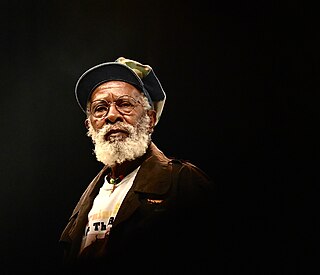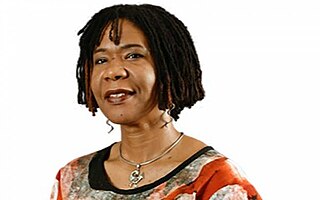
Reggae is a music genre that originated in Jamaica in the late 1960s. The term also denotes the modern popular music of Jamaica and its diaspora. A 1968 single by Toots and the Maytals, "Do the Reggay", was the first popular song to use the word reggae, effectively naming the genre and introducing it to a global audience. While sometimes used in a broad sense to refer to most types of popular Jamaican dance music, the term reggae more properly denotes a particular music style that was strongly influenced by traditional mento as well as by American jazz and rhythm and blues, and evolved out of the earlier genres ska and rocksteady. Reggae usually relates news, social gossip, and political commentary. It is instantly recognizable from the counterpoint between the bass and drum downbeat and the offbeat rhythm section. The immediate origins of reggae were in ska and rocksteady; from the latter, reggae took over the use of the bass as a percussion instrument.

Winston Rodney OD, better known by the stage name Burning Spear, is a Jamaican roots reggae singer-songwriter, vocalist and musician. Burning Spear is a Rastafarian and one of the most influential and long-standing roots artists to emerge from the 1970s.
Roots reggae is a subgenre of reggae that deals with the everyday lives and aspirations of Africans and those in the African Diaspora, including the spiritual side of Rastafari, black liberation, revolution and the honouring of God, called Jah by Rastafarians. It is identified with the life of the ghetto sufferer, and the rural poor. Lyrical themes include spirituality and religion, struggles by artists, poverty, black pride, social issues, resistance to fascism, capitalism, corrupt government and racial oppression. A spiritual repatriation to Africa is a common theme in roots reggae.
The music of Jamaica includes Jamaican folk music and many popular genres, such as mento, ska, rocksteady, reggae, dub music, dancehall, reggae fusion and related styles.
Dancehall is a genre of Jamaican popular music that originated in the late 1970s. Initially, dancehall was a more sparse version of reggae than the roots style, which had dominated much of the 1970s. In the mid-1980s, digital instrumentation became more prevalent, changing the sound considerably, with digital dancehall becoming increasingly characterized by faster rhythms. Key elements of dancehall music include its extensive use of Jamaican Patois rather than Jamaican standard English and a focus on the track instrumentals.
Jamaican culture consists of the religion, norms, values, and lifestyle that define the people of Jamaica. The culture is mixed, with an ethnically diverse society, stemming from a history of inhabitants beginning with the original inhabitants of Jamaica. The Spaniards originally brought slavery to Jamaica. Then they were overthrown by the English. Jamaica later gained emancipation on 1 August 1838, and independence from the British on 6 August 1962. Black slaves became the dominant cultural force as they suffered and resisted the harsh conditions of forced labour. After the abolition of slavery, Chinese and Indian migrants were transported to the island as indentured workers, bringing with them ideas from their country.

Clifton George Bailey III, better known by his stage name Capleton, is a Jamaican reggae and dancehall musician. He is also referred to as King Shango, King David, The Fireman and The Prophet. His record label is called David House Productions. He is known for his Rastafari views expressed in his songs.
Perry Henzell was a Jamaican director. He directed the first Jamaican feature film, The Harder They Come (1972), co-written by Trevor D. Rhone and starring Jimmy Cliff.
Reggae Sunsplash is a reggae music festival first staged in 1978 in northern Jamaica. In 1985, it expanded with the addition of an international touring festival. The festival ran annually until 1996, with a final event in 1998, before it was revived in 2006. The festival returned for a virtual staging in 2020 produced by Tyrone Wilson, Randy McLaren, and Debbie Bissoon.
Slackness refers to vulgarity in West Indian culture, behavior, and music. It also refers to a subgenre of dancehall music with straightforward sexual lyrics performed live or recorded. Its form and pronunciation varies throughout the Caribbean.

Damion Darrel Warren, best known as Teacha Dee, is a Jamaican reggae singer and former educator. He is best known for his hit singles "Smoke and Fly", "Reggae Souljahs" and "Smuggling Weed". He was a full-time employee for the Ministry of Education Youth and Culture in Jamaica when he recorded all three songs. His stage name was derived from the Jamaican creole for "teacher" and a shortening of his childhood nickname "Demus".
Geoffrey Aloysius Chung was a Jamaican musician, recording engineer, and record producer.
Michael Edward Cushnie also known as Mykal Cushnie, is a Jamaican film director, film producer and editor. He is most recognized for his work on Magnum Kings and Queens of Dancehall - the Jamaican dancehall version of American Idol, The Wray & Nephew Contender - The Jamaican version of Mark Burnett's original boxing reality series The Contender, and Mission Catwalk- The Jamaican version of Project Runway. He is the CEO of DSE Media and founder of Edward Cushnie Films.

Fredrick “Freddie” McGregor is a Jamaican singer, musician and record producer. His music career began when he was seven years old.
Dancehall pop is a sub-genre of the Jamaican genre dancehall that originated in the early 2000s. Developing from the sounds of reggae, dancehall pop is characteristically different in its fusion with western pop music and digital music production. Dancehall pop is also different from dancehall in that most songs use lesser Jamaican Patois in lyrics––allowing it to be globally understood and consumed. It also incorporates the key pop music elements of having melodies, hooks, and the verse-chorus format. Additionally, the genre moves away from the reggae and roots reggae music origins in social and political protest, now lyrically centering on partying, dancing, and sexuality.
Lenora Antoinette Stines, better known as L'Antoinette Ọṣun Awade Wemo Stines is a Jamaican director, choreographer, author, actor and dancer. She is the founder and artistic director of L'Acadco: A United Caribbean Dance Force, an industry-leading contemporary dance company based in Jamaica. Stines is also the creator of the first Anglo Caribbean Modern Contemporary training procedure called L'Antech. L'Antech is an eclectic Caribbean contemporary technique that synthesizes African influences, Caribbean folklore, and is dominated by Jamaican Afro-Caribbean forms.
Barbara Makeda Blake-Hannah is a Jamaican author and journalist known for her promotion of Rastafari culture and history. She is also a politician, filmmaker, festival organiser and cultural consultant. She was one of the first black people to be an on-camera reporter and interviewer on British television when, in 1968, she was employed by Thames Television's evening news programme Today. Hannah was sacked because viewers complained about having a black woman on screen. She later returned to Jamaica and was an independent senator in the Parliament of Jamaica from 1984 to 1987.

Sonjah Stanley Niaah is a Jamaican scholar, cultural activist, and writer. She is known for her work on dancehall, old and new Black Atlantic performance geographies, ritual, dance, festivals, cultural and creative industries, as well as popular culture and the sacred.
Julian Henriques is a British filmmaker, researcher, writer and academic. He is a professor at Goldsmiths, University of London, in the Media and Communications Department, with his particular research interests being culture, technology and reggae sound systems.






